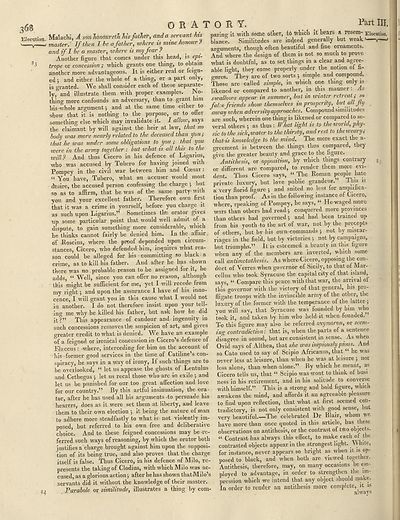Encyclopaedia Britannica > Volume 15, NIC-PAR
(418) Page 368
Download files
Complete book:
Individual page:
Thumbnail gallery: Grid view | List view

368
Elocution.
ORATORY. Part III.
Maiacli, A son Unmretl 1m father, and a servant his paring it with some other, towhikl. it beaB Hoeation.
■ rr ±7^^ t ntihpi'p is mine, honour ?
.34
master. If then I he a father, where is mine honour $
and if I be a master, where is my fear ?
Another figure that comes under this head, is epi-
trope or concession ; which grants one thing, to obtain
another more advantageous. It is either real or feign¬
ed 5 and either the whole of a thing, or a part only,
is granted. We shall consider each of these separate¬
ly,*3 and illustrate them with proper examples. No¬
thing more confounds an adversary, than to grant him
Iris whole argument j and at the same time either to
show that it is nothing to the purpose, or to offer
something else which may invalidate it. I allow, says
the claimant by will against the heir at law, that no
body was more nearly related to the deceased than you $
that he was under some obligations to you ; that you
were in the army together : but what is all this to the
will 2 And thus Cicero in his defence of Ligarius,
who was accused by Tubero for having joined with
Pompey in the civil war between him and Caesar:
“ You have, Tubero, what an accuser would most
desire, the accused person confessing the charge *, hut
so as to affirm, that he was of the same party with
you and your excellent father. Therefore own first
that it was a crime in yourself, before you charge it
as such upon Ligarius.” Sometimes the orator gives
up some particular point that would W’ell admit of a
dispute, to gain something more considerable, which
he thinks cannot fairly be denied him. In the affair
of Roscius, where the proof depended upon circum¬
stances, Cicero, who defended him, inquires what rea¬
son could be alleged for his committing so black a
crime, as to kill his father. And after he has shown
there was no probable reason to be assigned for it, he
adds, “ Well, since you can offer no reason, although
this might be sufficient for me, yet I will recede from
my right *, and upon the assurance I have ot his inno¬
cence^ I will grant you in this cause what I would not
in another. I do not therefore insist upon your tell¬
ing me why he killed his father, but ask how he did
it?” This appearance of candour and ingenuity in
such concessions removes tlie suspicion of art, and gives
greater credit to what is denied. Y e have an example
of a feigned or ironical concession in Cicero’s defence of
Elaccus: where, interceding for him on the account of
his former good services in the time of Catiline’s con¬
spiracy, he says in a way of irony, If such things are to
be overlooked, “ let us appease the ghosts of Lentulus
and Cethegus •, let us recal those who are in exile ; and
let us be punished for our too great affection and love
for our country.” By this artful insinuation, the ora¬
tor, after he has used all his arguments to persuade his
hearers, does as it were set them at liberty, and leave
them to their own election ; it being the nature of man
to adhere more steadfastly to what is not violently im¬
posed, but referred to his own free and deliberative
choice. And to these feigned concessions may be re¬
ferred such ways of reasoning, by which the orator both
justifies a charge brought against him upon the supposi¬
tion of its being true, and also proves that the charge
itself is false. Thus Cicero, in his defence of Milo, re¬
presents the taking of Clodius, with which Milo was ac¬
cused, as a glorious action} after he has shown that Milo’s
servants did it without the knowledge of their master.
Parabole or similitude, illustrates a thing by com-
blance. Similitudes are ind,eed generally but weak
arguments, though often beautiful and fine ornaments.
And where the design of them is not so much to prove
what is doubtful, as to set things in a clear and agree¬
able light, they come properly under the notion of fi¬
gures. They are of turn sorts ; simple and compound.
Those are called simple, in which one thing only is
likened or compared to another, in this manner: As
swallows appear in summer, but in winter retreat; so
false friends show themselves in prosperity, but all fly .
aujay when adversity approaches. Compound similitudes
are such, wherein one thing is likened or compared to se¬
veral others j as thus : What light is to the world, phy¬
sic to the sick, water to the thirsty, and rest to the weary i
that is knowledge to the mind. The more exact the a-
greement is between the things thus compared, they
.rive the greater beauty and grace to the figure.
Antithesis, or opposition, by which things contrary
or different are -compared, to render them more evi¬
dent. Thus Cicero says, “ The Roman people hate
private luxury, but love public grandeur. ’ This is
a very florid figure ; and suited no less loi amplifica¬
tion than proof. As in the following instance of Cicero,
where, speaking of Pompey, he says, “ He waged more
wars than others had read ’, conquered more provinces
than others had governed •, and had been trained up
from his youth to the art of war, not by the precepts
of others, but by his own-commands ) not by miscar¬
riages in the field, but by victories *, not by campaigns,
hut triumphs.” It is esteemed a beauty in this figure
when any of the members are inverted, which some
call antimetathesis. As where-Cicero, opposing the con¬
duct of Verres when governor of Sicily, to that of Mar¬
cellos who took Syracuse the capital city of that island,
says, “ Compare this peace with that war, the airival ot
this governor with the victory of that general, his pro¬
fligate troops with the invincible army of the other, the
luxury of the former with the temperance ot the latter j
you will say, that Syracuse was founded by him who
took it, anil taken by him who held it when founded.”
To this figure may also be referred oxymoron, or seem¬
ing contradiction: that is, when the parts of a sentence
disagree in sound, but are consistent in sense. As when
Ovid says of Althea, that she was impiously pious. And
so Cato used to say of Scipio Africanus, that ‘ he wTas
never less at leisure, than when he was at leisure; nor
less alone, than when-alone.” By which he meant, as
Cicero tells us, that “ Scipio was wont to think of busi
ness in his retirement, and in his solitude to converse
with himself.” This is a strong and bold figure, which
awakens the mind, and affords it an agreeable pleasure
to find upon reflection, that what at first seemed con¬
tradictory, is not only consistent with good sense, but
very beautiful.—The celebrated Dr Blair, whom vve
have more than once quoted in this article, has these
observations on antithesis, or the contrast of two objects.
“ Contrast has always this effect, to make each of the
contrasted objects appear in the strongest light, \\hite,
for instance, never appears so bright as when it is op¬
posed to black, and when both are viewed together.
Antithesis, therefore, may, on many occasions be em¬
ployed to advantage, in order to strengthen the im¬
pression which we intend that any object should make.
In order to render an antithesis more complete, it is
always
Elocution.
ORATORY. Part III.
Maiacli, A son Unmretl 1m father, and a servant his paring it with some other, towhikl. it beaB Hoeation.
■ rr ±7^^ t ntihpi'p is mine, honour ?
.34
master. If then I he a father, where is mine honour $
and if I be a master, where is my fear ?
Another figure that comes under this head, is epi-
trope or concession ; which grants one thing, to obtain
another more advantageous. It is either real or feign¬
ed 5 and either the whole of a thing, or a part only,
is granted. We shall consider each of these separate¬
ly,*3 and illustrate them with proper examples. No¬
thing more confounds an adversary, than to grant him
Iris whole argument j and at the same time either to
show that it is nothing to the purpose, or to offer
something else which may invalidate it. I allow, says
the claimant by will against the heir at law, that no
body was more nearly related to the deceased than you $
that he was under some obligations to you ; that you
were in the army together : but what is all this to the
will 2 And thus Cicero in his defence of Ligarius,
who was accused by Tubero for having joined with
Pompey in the civil war between him and Caesar:
“ You have, Tubero, what an accuser would most
desire, the accused person confessing the charge *, hut
so as to affirm, that he was of the same party with
you and your excellent father. Therefore own first
that it was a crime in yourself, before you charge it
as such upon Ligarius.” Sometimes the orator gives
up some particular point that would W’ell admit of a
dispute, to gain something more considerable, which
he thinks cannot fairly be denied him. In the affair
of Roscius, where the proof depended upon circum¬
stances, Cicero, who defended him, inquires what rea¬
son could be alleged for his committing so black a
crime, as to kill his father. And after he has shown
there was no probable reason to be assigned for it, he
adds, “ Well, since you can offer no reason, although
this might be sufficient for me, yet I will recede from
my right *, and upon the assurance I have ot his inno¬
cence^ I will grant you in this cause what I would not
in another. I do not therefore insist upon your tell¬
ing me why he killed his father, but ask how he did
it?” This appearance of candour and ingenuity in
such concessions removes tlie suspicion of art, and gives
greater credit to what is denied. Y e have an example
of a feigned or ironical concession in Cicero’s defence of
Elaccus: where, interceding for him on the account of
his former good services in the time of Catiline’s con¬
spiracy, he says in a way of irony, If such things are to
be overlooked, “ let us appease the ghosts of Lentulus
and Cethegus •, let us recal those who are in exile ; and
let us be punished for our too great affection and love
for our country.” By this artful insinuation, the ora¬
tor, after he has used all his arguments to persuade his
hearers, does as it were set them at liberty, and leave
them to their own election ; it being the nature of man
to adhere more steadfastly to what is not violently im¬
posed, but referred to his own free and deliberative
choice. And to these feigned concessions may be re¬
ferred such ways of reasoning, by which the orator both
justifies a charge brought against him upon the supposi¬
tion of its being true, and also proves that the charge
itself is false. Thus Cicero, in his defence of Milo, re¬
presents the taking of Clodius, with which Milo was ac¬
cused, as a glorious action} after he has shown that Milo’s
servants did it without the knowledge of their master.
Parabole or similitude, illustrates a thing by com-
blance. Similitudes are ind,eed generally but weak
arguments, though often beautiful and fine ornaments.
And where the design of them is not so much to prove
what is doubtful, as to set things in a clear and agree¬
able light, they come properly under the notion of fi¬
gures. They are of turn sorts ; simple and compound.
Those are called simple, in which one thing only is
likened or compared to another, in this manner: As
swallows appear in summer, but in winter retreat; so
false friends show themselves in prosperity, but all fly .
aujay when adversity approaches. Compound similitudes
are such, wherein one thing is likened or compared to se¬
veral others j as thus : What light is to the world, phy¬
sic to the sick, water to the thirsty, and rest to the weary i
that is knowledge to the mind. The more exact the a-
greement is between the things thus compared, they
.rive the greater beauty and grace to the figure.
Antithesis, or opposition, by which things contrary
or different are -compared, to render them more evi¬
dent. Thus Cicero says, “ The Roman people hate
private luxury, but love public grandeur. ’ This is
a very florid figure ; and suited no less loi amplifica¬
tion than proof. As in the following instance of Cicero,
where, speaking of Pompey, he says, “ He waged more
wars than others had read ’, conquered more provinces
than others had governed •, and had been trained up
from his youth to the art of war, not by the precepts
of others, but by his own-commands ) not by miscar¬
riages in the field, but by victories *, not by campaigns,
hut triumphs.” It is esteemed a beauty in this figure
when any of the members are inverted, which some
call antimetathesis. As where-Cicero, opposing the con¬
duct of Verres when governor of Sicily, to that of Mar¬
cellos who took Syracuse the capital city of that island,
says, “ Compare this peace with that war, the airival ot
this governor with the victory of that general, his pro¬
fligate troops with the invincible army of the other, the
luxury of the former with the temperance ot the latter j
you will say, that Syracuse was founded by him who
took it, anil taken by him who held it when founded.”
To this figure may also be referred oxymoron, or seem¬
ing contradiction: that is, when the parts of a sentence
disagree in sound, but are consistent in sense. As when
Ovid says of Althea, that she was impiously pious. And
so Cato used to say of Scipio Africanus, that ‘ he wTas
never less at leisure, than when he was at leisure; nor
less alone, than when-alone.” By which he meant, as
Cicero tells us, that “ Scipio was wont to think of busi
ness in his retirement, and in his solitude to converse
with himself.” This is a strong and bold figure, which
awakens the mind, and affords it an agreeable pleasure
to find upon reflection, that what at first seemed con¬
tradictory, is not only consistent with good sense, but
very beautiful.—The celebrated Dr Blair, whom vve
have more than once quoted in this article, has these
observations on antithesis, or the contrast of two objects.
“ Contrast has always this effect, to make each of the
contrasted objects appear in the strongest light, \\hite,
for instance, never appears so bright as when it is op¬
posed to black, and when both are viewed together.
Antithesis, therefore, may, on many occasions be em¬
ployed to advantage, in order to strengthen the im¬
pression which we intend that any object should make.
In order to render an antithesis more complete, it is
always
Set display mode to:
![]() Universal Viewer |
Universal Viewer | ![]() Mirador |
Large image | Transcription
Mirador |
Large image | Transcription
Images and transcriptions on this page, including medium image downloads, may be used under the Creative Commons Attribution 4.0 International Licence unless otherwise stated. ![]()
| Encyclopaedia Britannica > Encyclopaedia Britannica > Volume 15, NIC-PAR > (418) Page 368 |
|---|
| Permanent URL | https://digital.nls.uk/192587132 |
|---|
| Attribution and copyright: |
|
|---|
| Shelfmark | EB.11 |
|---|---|
| Description | Ten editions of 'Encyclopaedia Britannica', issued from 1768-1903, in 231 volumes. Originally issued in 100 weekly parts (3 volumes) between 1768 and 1771 by publishers: Colin Macfarquhar and Andrew Bell (Edinburgh); editor: William Smellie: engraver: Andrew Bell. Expanded editions in the 19th century featured more volumes and contributions from leading experts in their fields. Managed and published in Edinburgh up to the 9th edition (25 volumes, from 1875-1889); the 10th edition (1902-1903) re-issued the 9th edition, with 11 supplementary volumes. |
|---|---|
| Additional NLS resources: |
|

